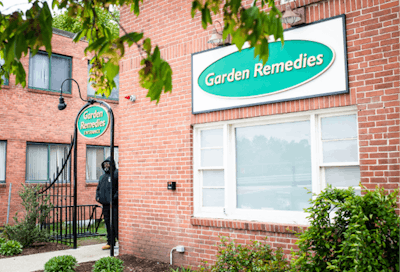

If you have launched a business in the cannabis industry, at one point or another you have probably wished for a guidebook or mentor to refer to when hurdles appeared insurmountable. Jeffrey Herold sure did.
Herold, COO of Massachusetts’ Garden Remedies, a vertically integrated cannabis company, remembers the company’s senior leadership sitting around a conference room table about 18 months ago, commiserating over the challenges they overcame to launch their operation in the Bay State. The wide-ranging conversation spanned lessons learned, mistakes made and “how just having a one-on-one mentor that had been through this would’ve really helped,” Herold says.
A team member chimed in: “Why don’t we launch a mentorship program?”

That thought sparked the idea for Garden Remedies’ Catalyst Mentoring Program that pairs team members with cannabis license applicants to help guide these license hopefuls through the early stages of launching their businesses.
Some might think that helping potential rival business owners is a bad decision, but Garden Remedies has a different perspective. “I think it's a big industry, and we think there's plenty of [market share] to go around,” Herold says. “We'd much rather help people do it right so that the industry as a whole doesn't get a bad name.”

Program Launch
Garden Remedies’ team knew that it wanted the mentorship program to have a personal feel to it. “Originally, it didn't feel like it was going to be too structured and more just a one on-one-mentor relationship, where if somebody has a question, they know somebody in our organization that they can call,” Herold details.
While it has retained a personal level of support, the program has evolved into a 14-week program with three separate tracks: cultivation, processing and retail, the same industry verticals in which Garden Remedies operates today. Each track has one designated mentor, and the inaugural class saw one mentee paired with each mentor.

Garden Remedies isn’t directly training program participants on how to cultivate cannabis, process edibles or manage a dispensary. Rather, mentors are there to answer questions and help their mentees avoid making the same mistakes they did in the licensing process, with design or with sourcing materials.
Mentees have weekly calls with their mentors to discuss any issues they encountered that week and get advice on what to expect from the next steps in the process. Biweekly calls with various company subject matter experts relevant to each mentees’ business and licensing stage are also scheduled. Those experts remain available throughout the licensing program to answer questions related to their areas of expertise.
Herold is clear that there isn’t a business relationship being established, but a personal one. And even though the program formally is 14 weeks, mentees are expected to make connections that last beyond the terms of the mentorship. “[These mentees] literally call us … when any kind of question comes up that may take them hours to research, and they can call our head of security [for example] and get the answer in just two minutes,” he says.

First Class
The first Catalyst class graduated May 2, and two of the three graduates had economic empowerment priority status, meaning they all qualified as businesses having “practices that promote … economic empowerment in communities disproportionately impacted by high rates of arrest and incarceration for offenses under state and federal laws, including the Controlled Substances Act,” according to the Massachusetts Cannabis Control Commission (MCCC).
Caroline Pineau, owner of Stem—a dispensary license applicant based in Haverhill, Mass. (a city designated by the MCCC as one of the 29 areas where drug laws had a disproportionate impact)—is a Catalyst graduate. A yoga studio owner and instructor, she first heard about the program through a business associate, and, after some additional research, reached out quickly.
“To have the opportunity to learn from some of the best in the industry … has been instrumental and has really helped to propel my project forward,” Pineau says.

Her mentor, Julia Wentworth, Garden Remedies’ director of retail operations, spoke with Pineau every week and discussed everything from “floor plan … all the way down to paper clips,” Wentworth says. Store design is Wentworth’s specialty, as she is in the process of designing her third dispensary—Garden Remedies’ Marlborough location.
Pineau, for her part, is quick to give credit to Wentworth and Garden Remedies for continuing to help shape her business to match her vision. “[Julia] has vast retail experience and really helped me hone in on exactly how I wanted the flow of the experience to take shape,” Pineau says. “I really felt like they were a resource in every aspect of my business and really helped to shape my business strategy, and also helped me to feel really empowered that I can be an aspiring leader in this industry, even as a mom-and-pop operator.”
Brian MacIver is senior editor of Cannabis Dispensary magazine.

























